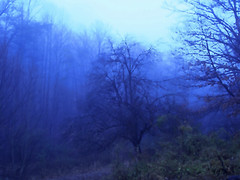I’m currently reading Birch Browsings, which is a collection of John Burroughs (1837-1921) nature writings (thanks to Kevin, who loaned me his book). Burroughs was a contemporary of John Muir, albeit not as famous, and I have read many snippets of his writings over the years and always enjoyed them. This is my first time to read a complete book of his writings, though. Good stuff.
Here’s an excerpt from his essay, Summer Voyage, in which he describes a simple, pleasant boat trip he made down the Delaware River to Philadelphia. It seems appropriate timing with the Great Rain of 2009 we’ve just experienced here…
The wind still boded rain, and about four o’clock, announced by deep-toned thunder and portentous clouds, it began to charge down the mountain-side in front of me. I ran ashore… and took my way up through an orchard to a quaint little farmhouse.
But there was not a soul about, outside or in, that I could find, though the door was unfastened; so I went into an open shed with the hens, and lounged upon some straw, while the loosed floods came down. It was better than boating or fishing. Indeed, there are few summer pleasures to be placed before that of reclining at ease directly under a sloping roof, after toil or travel in the hot sun, and looking out into the rain-drenched air and fields. It is such a vital yet soothing spectacle.
We sympathize with the earth. We know how good a bath is, and the unspeakable deliciousness of water to a parched tongue. The office of the sunshine is slow, subtle, occult, unsuspected; but when the clouds do their work the benefaction is so palpable and copious, so direct and wholesale, that all creatures take note of it, and for the most part rejoice in it. It is a completion, a consummation, a paying off of a debt with a royal hand; the measure is heaped and overflowing. It was the simple vapor of water that the clouds borrowed of the earth; now they pay back more than water: the drops are charged with electricity and the gases of the air, and have new solvent powers. Then, how the slate is sponged off and left all clean and new again!
=======
Hallelujah!, right? I have a question about this. In this essay, Burroughs happens upon a farmhouse where no one is home. He proceeds to make himself at home in the henhouse, to get out of the rain. It is my estimation that this was more of a common thing in centuries past. That it would be assumed that it’s okay for someone to just enter your barn or shed to get out of the rain, even if you were a stranger. It reminds me of the Old Testament passages, in which it is assumed that good folk ought to welcome strangers, that “aliens” visiting Israel had a right to just come up and harvest at the edge of a farmfield in order to keep themselves from starving. In a time with no hotels or fast food joints, the presumption of at least a degree of Welcome makes sense.
But I don’t know that to be the case here. In this time period, would Burroughs’ actions have been commonly acceptable? Does anyone know? Greenman Tim, are you around reading this?

No comments:
Post a Comment